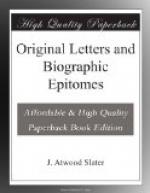J. ATWOOD.SLATER,
Medallist & Premium Holder of the Royal Academy of Arts, London.
4, Hill Side, Cotham Hill, Bristol,
Epiphany, 1903.
LITERATURE.
To the Editor of THE BIRMINGHAM GAZETTE.
March, 1903.
Sir,—Touched by a virtuous sense that a noble writer has passed from the central and celestial sphere of his vocation, and discharging the offices of respect voluntarily admitted as a literary admirer, with sympathy in a bruised state of liquefaction, I maintain that the season for uttering a few words is clearly at hand, and should be turned to the advantage of retrospect.
Being bred of a generation which has read, with a spirit attuned to the pleasant influences of an Academic and a Saracenic art, the writings of John Henry Shorthouse, and ever discovering them to contain philosophic importance and pyschologic expression decidedly above the astuteness and ability of average writers; and having usually in them remarked wisdom, council and knowledge reminiscent of the inspired logicial writers and divines of the law-given Testaments; in point of enquiry, I am summarily induced to champion the belief that the psychologic, emphatic style adopted by the writer, with the success in high quarters attendant the disposal of his works, has not, convincingness being the indicator, been reached, nor surpassed. The Warwickshire alchemist invariably throws across his scenes and to the centre, a glare, a strong ray, which burns to the water-line the barque of Agnosticism. This is tacitly recognised, concurrently and alternately traced in the selection of the phrases, and in the subtle or dramatic sense of the scene photographed; the second inspiration springing into immediate co-operation, linking to the first the thought by a magnetised hyphen, causes his symbolistic pictures to thrive gloriously, rapturously; the first touch of sensitized matter at times appearing grotesque, dimly lit, although never flimsy. This pedantic, pictorial, even scholarly system by our revered writer adopted, is bent, applied to meet extreme passes of imaginative perfection and delicacy. The picture is naively introduced and obscurely, somewhat trenchantly elaborated, allows itself to be apologetically understood; whilst in succession the lower taste for animal sentiment is sorcerized by vivid flashes of captivating contrast, forked, as lightning, and left, as embers smouldering to glow in the crucible of memory’s recesses. Specious instances of irony playing the manliest part: flashes of meteoric, mesmeric eloquence, fitfully flecking the embossed page, as one tier or set of ideas, in rhetoric orchestration, symphonizes with or eclipses another. Connection, an element of robust mesmeric cohesion with this prized author being the adamantine hyphen, the articulating link, which compacts the roll. John Henry Shorthouse, the templar, the confessor of music, was, and concurrently, the apologist




